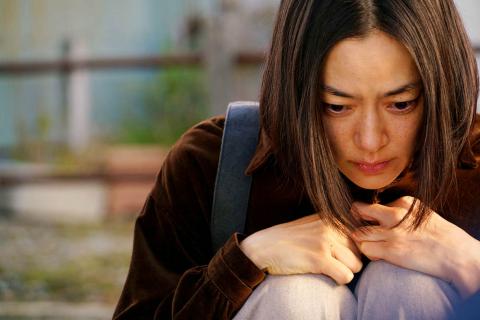In the sleepy coastal town of Uobuka, the statue of a googly-eyed green sea monster named Nororo towers over a precipice. According to legend, Nororo is an evil presence from the sea and whoever looks into its eyes will be damned. In ancient times, annual sacrifices were made every year during Uobuka’s own Nororo Festival — two villagers would be chosen to jump off the cliff; one would be saved, while the other would sink and drown.
This slice of Japanese folklore is merely an appetizer for the real bizarreness to come in The Scythian Lamb, the latest film by Daihachi Yoshida, which won the prestigious Kim Ji-seok award at last year’s Busan International Film Festival. Based on a manga by Tatsuhiko Yamagami and Mikio Igarashi, this offbeat black comedy is a fine blend of droll humor, drama and romance spread out across a substantial 126-minutes running time.
Tsukisue (Ryo Nishikido) is a city official in charge of a new government resettlement project that grants parole to low-risk prisoners in Uobuka, a coastal town known for its “nice people” and “great seafood.” If these prisoners stay here for 10 years, their sentences will be reduced, and they will be free to go. Tsukisue’s boss believes it is an effective way to kill two birds with one stone: not only will it curtail public costs of keeping inmates, the injection of new blood will simultaneously fight the problem of rapid depopulation in Japan’s rural towns.

photo courtesy of Far East Film Festival
It is soon discovered that these six prisoners, in fact, were convicted of murder, and it’s up to Tsukisue to ensure that their true identities remain concealed to the general townsfolk. But it doesn’t take long before a body washes up on Uobuka, and Tsukisue begins to doubt the seemingly reformed ways of the new residents.
Yoshida continues his trademark of whimsical genre hybrids with The Scythian Lamb, though his latest feature is considerably toned down compared to previous works such as The Kirishima Thing.
We are introduced to a colorful, motley crew of flawed characters, including the likes of jittery barber Fukumoto (Shingo Mizusawa), who slit his ex-boss’s throat with a razor, the sexy Ota (Yuka), who finds love again in Tsukisue’s elderly father, former Yakuza member Ono (Min Tanaka), the questionable Sugiyama (Kazuki Kitamura) and the courteous and placid Miyakoshi (Ryuhei Matsuda), who begins dating Tsukisue’s surly crush Aya (Fumino Kimura).

photo courtesy of Far East Film Festival
For a bunch of stock prisoners defined by the same cold-blooded crime, Yoshida has done well to craft distinctive personalities for each individual, alongside humanistic backstories capable of inducing pathos. With that, it’s even more of a pity that equal character development is not followed through across the board — the terrific Mikako Ichikawa is sorely underused as an ex-victim of relationship abuse, and a recluse who buries dead animals in the soil of her backyard.
Buoyed by a rock soundtrack with bewitching guitar riffs, The Scythian Lamb unfolds with an unhurried pace that often lulls the audience into a false sense of security before the rug is pulled out from underneath. Tonal shifts are skilfully executed, with dramatic tension ratcheted up in the second half of the film, alongside bouts of chilling violence dished out in a casual, low-key fashion.
Drawing on elements of an animal fable, The Scythian Lamb refers to the Vegetable Lamb of Tartary, a zoophyte believed to grow sheep as its fruit. The sheep were connected to a plant by an umbilical cord, and once they had finished grazing on the surrounding greens, both sheep and plant would perish.
Some interesting questions about the mutability of human nature and the deceptiveness of appearances are also raised: Can a leopard really change its spots? Should we grant second chances to sinners? Does karma really exist?
The omnipresence of Nororo and the exploration of the rituals in a small-town festival further ground the narrative in the mystical and mundane, creating an intriguing world far detached from reality.

June 9 to June 15 A photo of two men riding trendy high-wheel Penny-Farthing bicycles past a Qing Dynasty gate aptly captures the essence of Taipei in 1897 — a newly colonized city on the cusp of great change. The Japanese began making significant modifications to the cityscape in 1899, tearing down Qing-era structures, widening boulevards and installing Western-style infrastructure and buildings. The photographer, Minosuke Imamura, only spent a year in Taiwan as a cartographer for the governor-general’s office, but he left behind a treasure trove of 130 images showing life at the onset of Japanese rule, spanning July 1897 to

In an interview posted online by United Daily News (UDN) on May 26, current Chinese Nationalist Party (KMT) Chairman Eric Chu (朱立倫) was asked about Taichung Mayor Lu Shiow-yen (盧秀燕) replacing him as party chair. Though not yet officially running, by the customs of Taiwan politics, Lu has been signalling she is both running for party chair and to be the party’s 2028 presidential candidate. She told an international media outlet that she was considering a run. She also gave a speech in Keelung on national priorities and foreign affairs. For details, see the May 23 edition of this column,

The Taiwan People’s Party (TPP) on May 18 held a rally in Taichung to mark the anniversary of President William Lai’s (賴清德) inauguration on May 20. The title of the rally could be loosely translated to “May 18 recall fraudulent goods” (518退貨ㄌㄨㄚˋ!). Unlike in English, where the terms are the same, “recall” (退貨) in this context refers to product recalls due to damaged, defective or fraudulent merchandise, not the political recalls (罷免) currently dominating the headlines. I attended the rally to determine if the impression was correct that the TPP under party Chairman Huang Kuo-Chang (黃國昌) had little of a

At Computex 2025, Nvidia CEO Jensen Huang (黃仁勳) urged the government to subsidize AI. “All schools in Taiwan must integrate AI into their curricula,” he declared. A few months earlier, he said, “If I were a student today, I’d immediately start using tools like ChatGPT, Gemini Pro and Grok to learn, write and accelerate my thinking.” Huang sees the AI-bullet train leaving the station. And as one of its drivers, he’s worried about youth not getting on board — bad for their careers, and bad for his workforce. As a semiconductor supply-chain powerhouse and AI hub wannabe, Taiwan is seeing